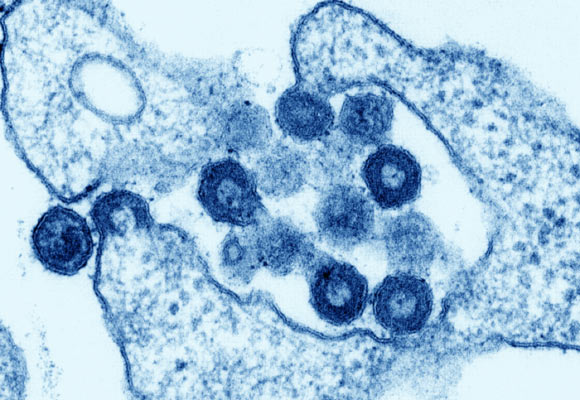Scientists from the University of Oxford and Plymouth University, both in UK, have found evidence of Neanderthal and Denisovan viruses in DNA of modern humans.

Virions of an ancient HML2 virus in a cancer cell. Image credit: K. Boller / Paul-Ehrlich-Institute.
In 2012, researchers from Albert Einstein College of Medicine identified remnants of 14 ancient viruses in the genome sequences of Neanderthal and Denisovan fossils, dating back about 40,000 years ago. But they failed to find remnants of these viruses, belonging to the HML2 retrovirus family, in the human reference genome sequence.
In a new study, Oxford University researcher Dr Gkikas Magiorkinis with colleagues compared Neanderthal and Denisovan data to genetic data from modern-day cancer patients and managed to identify remnants of one Neanderthal and seven Denisovan viruses.
The discovery will enable scientists to investigate possible links between HML2 retroviruses and modern diseases including HIV and cancer.
“How HIV patients respond to HML2 is related to how fast a patient will progress to AIDS, so there is clearly a connection there,” said Dr Magiorkinis, who is a co-author of the paper published in the journal Current Biology.
“HIV patients are also at much higher risk of developing cancer, for reasons that are poorly-understood. It is possible that some of the risk factors are genetic, and may be shared with HML2. They also become reactivated in cancer and HIV infection, so might prove useful as a therapy target in the future.”
The team is now investigating whether the ancient viruses affect a person’s risk of developing diseases such as cancer.
Combining evolutionary theory and population genetics with cutting-edge genetic sequencing technology, the scientists will test if these viruses are still active or cause disease in modern humans.
______
Bibliographic information: Emanuele Marchi et al. 2013. Neanderthal and Denisovan retroviruses in modern humans. Current Biology, vol. 23, no. 22, R994-R995; doi: 10.1016/j.cub.2013.10.028







